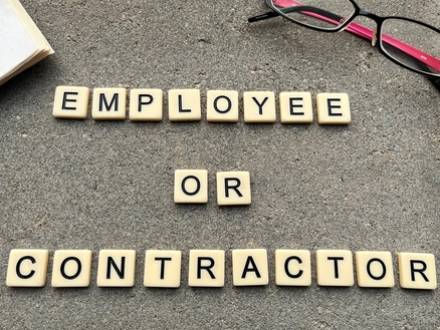
 847-995-1205
847-995-1205
Employee vs. Independent Contractor Disputes: Employer’s Burden
 In Illinois, as with all other states, the classification of a worker as an employee vs. an independent contractor has far-reaching consequences for benefits, taxes, and legal protections. An employer who misclassifies a worker can face steep penalties, unpaid wages, and expensive lawsuits. Many employers are unaware that the burden of proof when facing allegations of misclassification falls to them.
In Illinois, as with all other states, the classification of a worker as an employee vs. an independent contractor has far-reaching consequences for benefits, taxes, and legal protections. An employer who misclassifies a worker can face steep penalties, unpaid wages, and expensive lawsuits. Many employers are unaware that the burden of proof when facing allegations of misclassification falls to them.
When there is a dispute, the employer must demonstrate that the worker meets the legal criteria for independent contractor status, rather than the employee having to show he or she meets the legal criteria for an employee. If you are an Illinois employer facing allegations of misclassification, it is essential that you understand your obligations under the law. Speaking to an experienced Schaumberg, IL employment defense attorney can help you ensure your business remains compliant.
How Do Employers Know Whether Their Workers Are Correctly Classified?
The Illinois Employee Classification Act, 820 ILCS 185, specifically addresses the improper classification of employees as independent contractors in the construction industry, which is an industry where misclassification is very common. The IRS has dedicated pages to help employers properly classify workers.
Employers generally control an employee’s work, including how, when, and where the work is performed. An employee is usually integrated into the employee’s business and receives benefits like a retirement plan, paid time off, and health insurance. Employers withhold income taxes, unemployment taxes, Social Security taxes, and Medicare taxes from employees’ paychecks. Employees have some protections against termination without cause.
Independent contractors typically set how, when, and where they work and operate as a separate business that offers services to multiple clients. Independent contractors are responsible for their own benefits and paying their own taxes, and can be terminated much more easily than an employee.
What Tests May Be Used To Distinguish Employees from Independent Contractors?
Three tests are commonly used to determine whether a worker is an independent contractor or an employee. These tests include:
Control Test
The control test looks at several issues to determine whether the worker controls his or her own work or whether the employer controls the work. If an employer provides detailed instructions about how, when, and where to perform work, what tools to use, and where to purchase supplies, and also provides worker training, then the worker is considered an employee. An independent contractor has more control over every aspect of his or her work, deciding when and where to work, and how to accomplish tasks, with the client only specifying a desired outcome.
Economic Realities Test
The economic realities test asks whether a worker is economically dependent on the employer for work or is truly in business for himself or herself. Independent contractors usually have more than one client, so are not financially dependent on any single client, while employees receive most or all of their pay from one employer.
ABC Test
The ABC test is a three-pronged test that requires all three prongs to be met for a worker to be an independent contractor.
- The worker is free from the control and direction of the employer in connection with the performance of the work.
- The work is performed outside the usual course of the hiring entity’s business.
- The worker is customarily engaged in an independently established trade, occupation, profession, or business.
The Employer’s Burden of Proof
Courts presume employee status unless the employer proves otherwise. An employer may be asked to show contracts, proof of independence, financial control, and multiple clients for those workers classified as independent contractors. Consequences of misclassification can be severe, so employers should conduct regular audits of worker classifications to ensure compliance with the IRS, Department of Labor, and Illinois law.
Contact a Schaumburg, IL Employment Attorney
Misclassifying workers is not just a paperwork mistake; it is a legal risk that falls on the employer. When you have an experienced Schaumburg, IL worker classification lawyer from The Miller Law Firm, P.C., you can rest easy, knowing you are in compliance with the law. Attorney Miller has an MBA in finance, in addition to his law degree. Call 847-995-1205 to schedule your free consultation.
Contact Us


Schaumburg, IL 60173
Phone: 847-995-1205
